Book contents
- Frontmatter
- Contents
- Preface
- 1 Introduction
- 2 Two illustrations
- 3 Codes and coding
- 4 Seminar on open coding
- 5 Memos and memo writing
- 6 Team meetings and graphic representations as memos
- 7 Excerpts that illustrate common problems
- 8 Integrative diagrams and integrative sessions
- 9 Integrative mechanisms: diagrams, memo sequences, writing
- 10 Presenting case materials: data and interpretations
- 11 Grounded formal theory: awareness contexts
- 12 Reading and writing research publications
- 13 Questions and answers
- 14 Research consultations and teaching: guidelines, strategies, and style
- Epilogue
- Appendix Discovering new theory from previous theory
- References
- Author index
- Subject index
11 - Grounded formal theory: awareness contexts
Published online by Cambridge University Press: 26 January 2010
- Frontmatter
- Contents
- Preface
- 1 Introduction
- 2 Two illustrations
- 3 Codes and coding
- 4 Seminar on open coding
- 5 Memos and memo writing
- 6 Team meetings and graphic representations as memos
- 7 Excerpts that illustrate common problems
- 8 Integrative diagrams and integrative sessions
- 9 Integrative mechanisms: diagrams, memo sequences, writing
- 10 Presenting case materials: data and interpretations
- 11 Grounded formal theory: awareness contexts
- 12 Reading and writing research publications
- 13 Questions and answers
- 14 Research consultations and teaching: guidelines, strategies, and style
- Epilogue
- Appendix Discovering new theory from previous theory
- References
- Author index
- Subject index
Summary
In 1979 the author of this book read a paper at the annual meetings of the Society for the Study of Symbolic Interaction in San Francisco. It is reproduced here as a chapter to illustrate two points, neither of which has been emphasized in the previous chapters. First, how one goes about developing a formal theory; while most sociologists seem not to be personally interested in creating these higher-level theories, being content either to develop substantive theories about particular topical areas or just to describe ethnographically behavior in those areas, nevertheless the writing of formal theories is, from the grounded theory perspective, viewed as being ultimately of the greatest importance. Second, the chapter will illustrate how one can use written materials – technical or otherwise – for developing formal theory.
The emphasis will be on the use of theoretical sampling and the associated comparative analysis done right from the beginning of the research project, consequently the focus is more on open than on selective coding, nor are the special issues involved with the integration and writing up of formal theory discussed here. Getting off the ground with open coding is probably the most difficult step in developing a formal theory, as with substantive theory, so this chapter should prove useful to those who wish to learn this necessary skill, as applied now to the development of formal theories. Selective coding for formal theory seems not to present special issues except that the analysis is more abstract and based on more diverse kinds of data than for substantive theories.
- Type
- Chapter
- Information
- Qualitative Analysis for Social Scientists , pp. 241 - 248Publisher: Cambridge University PressPrint publication year: 1987



